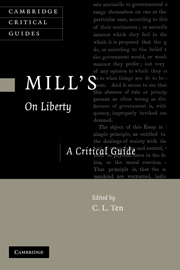Book contents
- Frontmatter
- Contents
- List of contributors
- Mill's On Liberty: Introduction
- 1 Mill's case for liberty
- 2 Mill's liberal principles and freedom of expression
- 3 Racism, blasphemy, and free speech
- 4 State neutrality and controversial values in On Liberty
- 5 Rawls's critique of On Liberty
- 6 Mill on consensual domination
- 7 Autonomy, tradition, and the enforcement of morality
- 8 Mill and multiculturalism
- 9 Mill, liberty, and (genetic) “experiments in living”
- 10 John Stuart Mill, Ronald Dworkin, and paternalism
- Bibliography
- Index
10 - John Stuart Mill, Ronald Dworkin, and paternalism
Published online by Cambridge University Press: 01 July 2009
- Frontmatter
- Contents
- List of contributors
- Mill's On Liberty: Introduction
- 1 Mill's case for liberty
- 2 Mill's liberal principles and freedom of expression
- 3 Racism, blasphemy, and free speech
- 4 State neutrality and controversial values in On Liberty
- 5 Rawls's critique of On Liberty
- 6 Mill on consensual domination
- 7 Autonomy, tradition, and the enforcement of morality
- 8 Mill and multiculturalism
- 9 Mill, liberty, and (genetic) “experiments in living”
- 10 John Stuart Mill, Ronald Dworkin, and paternalism
- Bibliography
- Index
Summary
INTRODUCTION
In On Liberty Mill famously wrote that
the sole end for which mankind are warranted, individually or collectively, in interfering with the liberty of action of any of their number, is self-protection. [Indeed] the only purpose for which power can be rightfully exercised over any member of a civilized community, against his will, is to prevent harm to others. His own good, either physical or moral, is not a sufficient warrant. He cannot rightfully be compelled to do or forbear because it will be better for him to do so, because it will make him happier, because, in the opinion of others, to do so would be wise, or even right. These are good reasons for remonstrating with him, or reasoning with him, or persuading him, but not for compelling him, or visiting him with any evil in case he do otherwise.
(CW XVIII, 223–4 [1, 9])Several aspects of Mill's account call for preliminary comment. First, even though he railed against interfering with the liberty of persons both for their physical good and for their moral good, it is Mill's denunciation of interferences of the former kind, rather than of the latter, that has made him a famed opponent of paternalistic interferences. Second, Mill's characterization of paternalism as involving interference with the liberty of individuals by way of compulsion suggests that he was presupposing the use of physical force. However, it is also possible to treat people paternalistically by way of deception (e.g., through the withholding of information).
- Type
- Chapter
- Information
- Mill's On LibertyA Critical Guide, pp. 209 - 227Publisher: Cambridge University PressPrint publication year: 2009



